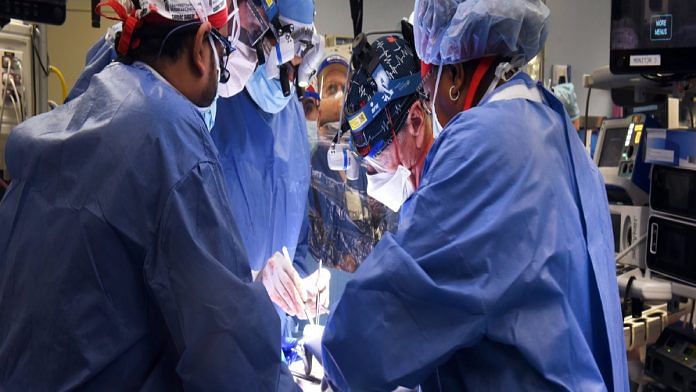Bengaluru: The first man to have successfully received a pig’s heart in a transplant may have died as a result of complications caused by a porcine virus, that was present in the heart in low amounts, and subsequently infected it.
David Bennett Sr. (57) died on 8 March this year at the University of Maryland Medical Center, two months after receiving the first fully successful xenotransplanted heart, taken from a genetically altered pig.
Traces of viral DNA found in his system belonged to a porcine virus that infects only pigs, not humans, according to findings first reported by MIT Technology Review. No evidence was found that the patient himself was infected or that his body had rejected the heart.
The patient had been severely immunocompromised before the transplant procedure, and it is suspected that the presence of the virus set off an infection inside or stemming from the heart. The pig had been cleaned and tested for detectable levels of pathogens before the transplant, hinting that the virus could have been present in small amounts.
The pig virus, a type of cytomegalovirus, is incapable of infecting humans or spreading among humans.
Pigs are used often for xenotransplanting procedures because they are easier to grow and raise, and their organs reach the size of human organs when they are just six months old.
Xenotransplantation — transplantation of an animal’s organ into a human recipient — is thought to be the optimal solution in the immediate future for solving the global medical organ shortage.
Also Read: Mixed-race US woman becomes first to be cured of HIV using new cord blood treatment
Genetically altered pig
Bennett Sr. was given the heart of a genetically altered pig in January this year, at the peak of a terminal heart illness.
The pig, developed by Revivicor, contained ten genetic modifications that made it easier for the human body to accept its heart. Pigs are easy to genetically modify, making their organs more suitable for human hosts. Their quick growth means that the results of any genetic modification as well as progression of disease can be observed efficiently.
Pig skin is commonly used as temporary graft for burn victims, and porcine heart valves are fitted into human hearts.
The transplant procedure, conducted by surgeons from New York University and University of Alabama, was the first-of-its-kind to be considered fully successful. The transplant followed several procedures of attempted xenotransplantation, none of which had been successful enough for new hosts to survive.
Over two months later, the causes that might have led to the death of Bennett Sr. are starting to become clear.
The pig cytomegalovirus — found in the patient’s system — is thought to have been in the pig before the procedure, in less-than-detectable amounts and in a latent form, which is why it wasn’t detected.
Similar to observations recorded in instances of baboon bodies receiving pig hearts with viruses, the porcine virus started to multiply within Bennett Sr’s heart following the transplant.
Future of xenotransplantation
The detection of porcine virus is not a major setback to advances made in xenotransplantation, experts say, suggesting that a more sensitive test would have detected the virus. The procedure itself was entirely successful, with the patient’s body functioning with the new heart as expected.
Many attempts have been made at xenotransplantation with animal organs over the years, with the first documented instance in France in 1905, but none have been successful owing to the human immune system rejecting the organs of other species.
The longest a patient has lived with a xenotransplanted organ, a chimpanzee’s heart, was nine months. While the procedure has historically been attempted more on kidneys, heart transplants are showing degrees of success, albeit with complications.
Last year, a temporary external transplant was performed with a pig’s heart connected to the body of a brain-dead patient. The heart functioned well for 54 hours, before the patient died of other causes.
Bennett Sr’s was the first successful complete case of xenotransplantation, and findings into the causes of his death have ignited discussions among experts about new pathogens and minimising their introduction into human population through xenotransplantation procedures.
(Edited by Amrtansh Arora)
Also Read: Oxford study on long Covid says even mild infection spurs ‘brain shrinkage’



